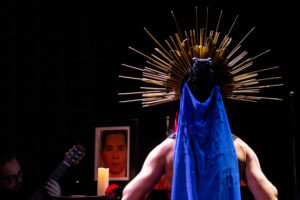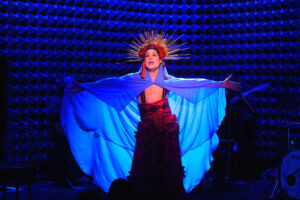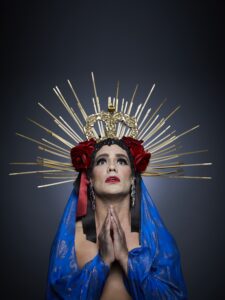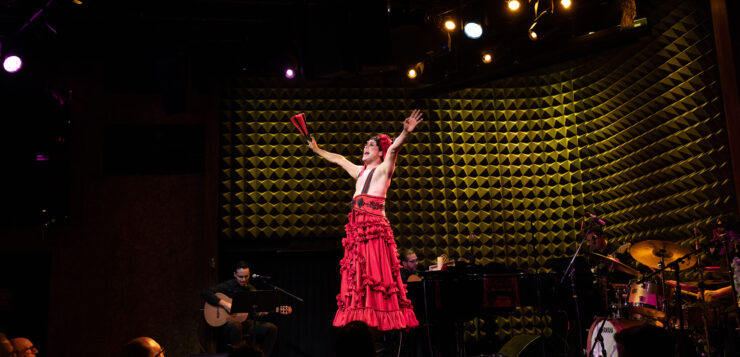
I grew up on a farm in Venezuela. I wasn’t necessarily aware of homophobia for a variety of reasons, perhaps mostly because I always felt so comfortable in my own skin. I’ve said it a hundred times, and I’ll say it for a long as I live: I was born to be an artist. I never really felt any choice in the matter, which is to say: being born gay, born to dream, born to move around the world—these are just a part of the fabric of who I am. I don’t think I was naturally inclined to feel shame about any of it. However, my relationship with my father was the biggest collision I had with homophobia. That journey is one of reconciliation and learning how my father’s own story intersects with mine.
We had a terrible relationship, my father and I. The only time he was nice to me was when he was drunk. The rest of the time, he was hostile and ashamed of me because I wasn’t as “masculine” as our machismo culture expects men to be. I remember one time we were in the car going somewhere, and I saw a man with the most beautiful blue eyes in another car on the road. I said to my parents, “Oh my god, his eyes are so beautiful!”
The next moment, I felt a stinging smack in the face. My father turned around while driving to hit me square in the jaw. He screamed at me: “Boys don’t say that about other men!” Oddly enough, while my dad was ashamed of my sexuality, he was the one who insisted that I take ballet if I was going to be a performer. He signed me up. He insisted I go and demanded that I be trained if I was going to have a life on the stage. That did not come across as supportive at the time, but when I look back on my short time, with him, I now realize that this gesture must have been some sort of nod of acceptance and encouragement, even if it wasn’t presented as such.
My impulse to create music started with an exploration of the Venezuelan folk songs, boleros, and opera that I grew up with—the same songs that my father used to sing to my mother. The times he sang were when I felt closest to him. He was never a father who would hug me or pick me up, or use touch in any way to show his love for me. But when he sang, it was a time of love, calm, and beauty. I found an embrace in his voice. All of his overtly macho strength seemed to melt away when he serenaded my mother. I wonder about how I internalized what my dad was singing for, and if that’s one of the reasons that song is just as important to me as any other art form I use in my work.
In the show, I don’t wait too long to reveal that my father died in front of my eyes while changing a light bulb when I was twelve. It’s not a secret, or some suspenseful surprise that the audience has to wait for. The upshot of my father’s death has more to do with the way I’ve learned to love my father since his death, and the realization that his statement, “I would rather have a prostitute daughter than have a faggot son,” was, in the end was actually an inspiration for my art. Instead of living in my gay male body, I spend time living inside the female character of Bizet’s Carmen, for instance. It’s a place where I explore the relationship between prostitution and scripture, romance and hatred, masculinity and femininity, and other tensions that came to represent my relationship with my father.

And so, LatinXoxo, my multidisciplinary performance show, is not so much about being gay, although that is a part of it. It’s also not a drag performance, if we were to define drag as a performance of exaggerated femininity or masculinity for entertainment purposes. When I wear women’s clothing in the show, I am inhabiting the roles of characters who come to tell the story of what I went through to reconcile with the memory of my father. LatinXoxo is about living the truth of who you are—whether gay, straight, trans, or anything in between. In my case, I was born to live inside my skin, even when others weren’t ready to see me as comfortable in it.
The process of making art is not a straight line. You think you’re making art about one thing when you’re actually making it about something else. When my work on the stage can be life-affirming, it is a bonus. When I opened the show at the Under the Radar Festival in NYC this past January, my husband and manager, David, turned to me before the show and said: “Who are you dedicating the performance to tonight?” I didn’t have to hesitate to say: “My dad.” He’s not around to tell me otherwise, so I choose to believe he would have been proud of who I am now. It is a performance I am really proud of, and I feel his presence with me on stage.
If I can be a conduit for others to find joy and acceptance in who they are, to feel comfortable in their own skin, then I am doing something very important. One of my artistic heroes, Marcel Marceau, used pantomime to save Jewish children escaping the Holocaust. The act of making art to save others isn’t necessarily how I relate to what I do, but I do think about the act of silence, or living out loud. And I think about the times we’re living in right now. I think
about why my father sang to my mother. In LatinXoxo, I sing a rendition of Beyonce’s “XO,” which has the line: “Your love is as bright as ever. Even in the shadows, baby kiss me—before they turn the lights out.” There’s a clear choice in life: love, and be as bright as ever, or fear the beauty in another man’s eyes. For me, the choice has always been clear.
 Migguel Anggelo is a Venezuelan-American singer-songwriter, multidisciplinary performing artist and countertenor, dancer, actor and painter. His work explores the intersections of his queer, Latino and immigrant identities using music, physical theater, dance, text and costume. As a theater creator, he has been awarded residencies to develop new works at MASS MoCA, the Kimmel Center, the Miami Light Project and beyond. You can find more information about his work on his website.
Migguel Anggelo is a Venezuelan-American singer-songwriter, multidisciplinary performing artist and countertenor, dancer, actor and painter. His work explores the intersections of his queer, Latino and immigrant identities using music, physical theater, dance, text and costume. As a theater creator, he has been awarded residencies to develop new works at MASS MoCA, the Kimmel Center, the Miami Light Project and beyond. You can find more information about his work on his website.





